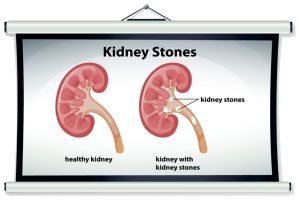
Researcher Dr. Andrew Rule explained, “Even after adjusting for other risk factors, including urine chemistries, hypertension, and obesity, we still found that those with a kidney stone episode had subsequent abnormal kidney function. This helps us better understand the long-term implications of kidney stones beyond recovery time.”
Temporarily kidney stones can lead to pain, discomfort, nausea, and difficulty passing urine, but the latest study shows there could be long-term effects of kidney stones on overall kidney function, even increasing the risk of chronic kidney disease.
Dr. Rule concluded, “This research shows that the implications of kidney stones may go beyond the discomfort they are so often associated with. Prevention of kidney stones may be beneficial for a person’s overall kidney health.”
What increases your risk of kidney stones?
Kidney stones form inside the kidneys and are incredibly painful to pass. There are many reasons why a kidney stone would develop, such as inadequate hydration, excess calcium buildup, and excess uric acid accumulation associated with a high protein diet. There are also other, less familiar causes of kidney stones you should be aware of.
For example, there are many health conditions that can increase the risk of kidney stones, including arthritis, colitis, Crohn’s disease, gout, high blood pressure, hyperparathyroidism, medullary sponge kidney, renal tubular acidosis, urinary tract infections, and inherited conditions where the kidneys are unable to excrete acid.
Other risk factors of kidney stones include:
- Eating a high-protein, low-fiber diet
- Being inactive or bed bound
- Having several kidney or urinary infections
- Having a kidney stone prior to the age of 25 can increase your risk of future episodes
- Having only one functioning kidney
- Taking certain medications like aspirin
Many of the risk factors associated with kidney stones are preventable or manageable, which means developing kidney stones is not inevitable. In order to reduce your risk of chronic kidney disease, take the necessary prevention steps to reduce your risk of kidney stones.